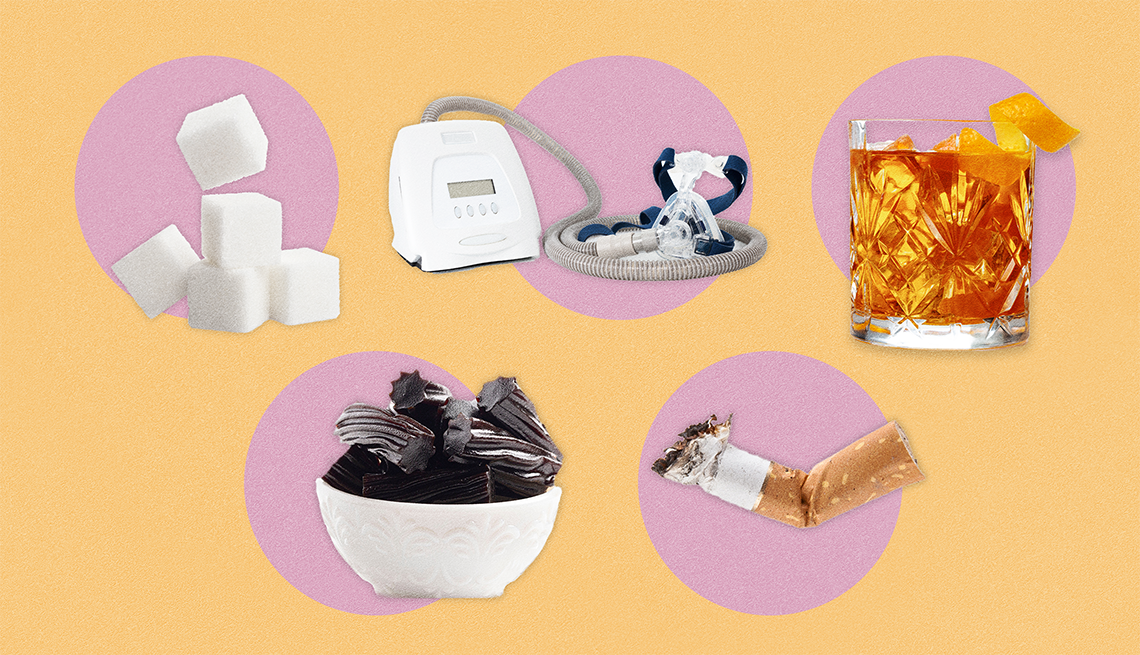AARP Hearing Center


High Blood Pressure Guide
- Symptoms, causes and tests
- Stages and types
- Treatment and prevention
- High blood pressure myths
- Alcohol and blood pressure
- Hypertension headache myths
- Smoking and high blood pressure
- Anxiety, stress and hypertension
- Is hypertension genetic?
- Medications that raise blood pressure
- Home blood pressure monitoring
- Surprising causes of hypertension
If you’re watching your blood pressure, you probably know common triggers that cause it to spike — too much salt or stress, for example.
But other factors can also raise your blood pressure and undermine your well-intentioned efforts to keep it in check, including certain foods, lifestyle habits and some underlying health conditions.
Read on for 12 surprising things that can send your numbers soaring.
1. Sleep apnea
Sleep apnea, a sleep disorder that causes a person to stop and restart breathing several times throughout the night, is one of the unusual causes of high blood pressure. And sleep apnea is becoming increasingly common in the U.S. as more Americans become overweight, says Donald Lloyd-Jones, M.D., director of the Framingham Center for Population and Prevention Science and primary investigator for the Framingham Heart Study. He also is past president of the American Heart Association. Excess weight is one of the leading risk factors for developing sleep apnea; age is another big one.
When a person with sleep apnea stops breathing, their brain steps in and wakes their body up to take a breath; this can happen 30 times or more an hour. “And when we don’t get good quality sleep — and particularly if we’re not getting good quality sleep because our airway gets closed and our brain and our body have to maintain enough awareness to try to open up the airway — that is very, very hard on the vascular system,” Lloyd-Jones says.
All the stress and strain are what give you high blood pressure — “and not just when we’re asleep but also when we’re awake for the rest of the day,” Lloyd-Jones says. It’s associated with a whole host of other health issues too, including an increased risk for heart attack, Type 2 diabetes and liver problems. Researchers at Johns Hopkins Medicine found that severe sleep apnea in middle or old age can increase the risk of premature death by up to 46 percent.
Snoring is a common warning sign of sleep apnea, so if someone tells you that you snore loudly or gasp often during sleep, talk to your health care provider. A number of devices and therapies can help treat sleep apnea, and studies suggest that treatment with a continuous positive airway pressure (CPAP) machine can reduce blood pressure numbers in just three months.
2. Irregular sleep schedule
What are the symptoms of high blood pressure?
High blood pressure — or hypertension — is often called the “silent killer” because it usually doesn’t have symptoms. But it can still be dangerous and cause damage to your blood vessels, heart, brain, kidneys, eyes and more. If left undetected or uncontrolled, high blood pressure can lead to:
- Heart attack
- Stroke
- Heart failure
- Kidney disease
- Vision loss
- Sexual dysfunction
- Angina (chest pain)
- Peripheral artery disease (narrowing of your arteries)
It’s estimated that nearly half of U.S. adults have high blood pressure, which is when the systolic (top number) is at least 130 millimeters Hg (mercury) or the diastolic (bottom number) is 80 mm Hg or more. Only about 1 in 4 adults with high blood pressure have it under control.
Source: American Heart Association, U.S. Centers for Disease Control and Prevention
Apnea isn’t the only thing during your sleep cycle that causes sudden high blood pressure. “People who don’t get six to eight hours of uninterrupted sleep can have elevated blood pressure,” says Luke Laffin, M.D., codirector of the Center for Blood Pressure Disorders at the Cleveland Clinic.
Several studies have found that sleepless nights can raise blood pressure not only throughout the night but also during the next day.
For quality sleep, go to bed and wake up at the same time every day, avoid drinking and eating 90 minutes before bed and don’t watch television or use your smartphone in bed. If you wake up and can’t fall back to sleep in 20 minutes, get up and do something else, Laffin says.
3. A full bladder
A full bladder is one of the causes of sudden high blood pressure that you can control. “A full bladder raises blood pressure about 10 to 15 points,” Laffin explains. When your bladder is full, it sends a signal to your brain to activate your nervous system, which can cause high blood pressure.
That’s why the American Heart Association recommends urinating before taking a blood pressure reading to ensure the most accurate results, particularly if you’re monitoring it at home.
“It’s fine to hold your urine if you’re in a situation where you cannot urinate freely. But if you have to urinate and can use the restroom, then you shouldn’t necessarily delay,” Laffin says.
Speaking of urination, getting up frequently at night to go may be a sign of hypertension. “If your blood pressure is elevated, that causes the body to say, ‘I need to lower my blood pressure.’ One way to do that is to urinate,” Laffin says.





































































More on Health
Best Exercise for Lowering Blood Pressure
New study finds this is #18 Ways to Get Heart Healthy
American Heart Association checklist now includes key components of cardiovascular health, from diet to sleep habits
Try These Tips for Living a Healthier Life
Small changes can add up to big mental and physical results